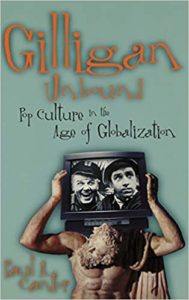I don’t remember meeting Professor Paul Cantor, but I read him voraciously, I admired him greatly, and I corresponded with him in the context of an upcoming collection of essays. I was shocked in learning that he died on February 26.

Cantor was an accomplished literary scholar who, as David Gordon wrote in an obituary, “attended Ludwig von Mises’s seminar while he was in high school, and he had a lifelong interest in Austrian economics”. Such an interest in Austrian economics brought him to be that rare thing: an intellectual in the humanities, even more- a literary critic- who had some sympathy for capitalism. At one level, this sympathy emerged in the very fact that he was not a snob: together with his Shakespeare studies, he cultivated an interest in popular culture that he understood as a living thing, and sometimes a beautiful thing too.
He wrote extensively on the matter, including his recent book The Invisible Hand in Popular Culture: Liberty vs. Authority in American Film and TV (2012), where you can find essays on John Ford and Martin Scorsese’s The Aviator but also on South Park and X-Files. Cantor’s essay on The Aviator (to which he had prefixed, in epigraph, a quote from Ludwig von Mises: “the first thing a genius needs is to breathe free air”) is one of my favourites. In that movie, Scorsese portrays Howard Hughes as “visionary and creative, even heroic” and celebrates his “perfectionism” as a businessman. Wrote Cantor:
Precisely because the world does not satisfy him, Hughes is always out to change it and improve it. His obsessive perfectionism continually drives him to new heights of achievement. He wants the perfect motion picture, the perfect airplane, and even the perfect woman, and in each case he keeps on holding and remoulding reality to fit his vinery expectations.
From the movie we take away the idea that “the thin line between madness and genius … cannot be drawn clearly,” but such a genius is clearly, and beautifully, identified with entrepreneurial activity. In Cantor’s work, it was quite evident that he had in mind the way in which Austrian economists try to understand entrepreneurship: besides the references to Mises and Hayek, it was his very description of the entrepreneurial role which smells of that tradition.

Cantor’s perhaps most famous book, insofar as his work on pop culture is concerned, is perhaps Gilligan Unbound: Pop Culture in the Age of Globalization (2003). In this book he deals with four American shows (Gilligan’s Island, Star Trek, The Simpsons, and The X-Files) and reads through them an evolution of the American understanding of government and political power. I read the book ages ago (when it came out!), and I still remember the brilliant dedication; the book is dedicated to one of Cantor’s VCR players (younger readers may Google what such things were), which passed away in the attempt to record a Star Trek marathon on the sci-fi channel. In that work, if I do remember correctly, Cantor thought that the American audience was getting more skeptical toward government, as X-Files was cultivating such a skepticism. I wonder if such a trend, however broadly defined, still holds or not (I guess not).
It is customary to lament, at libertarian gatherings, that we are relatively unsuccessful, as a movement, because we do not pay enough attention to pop culture and lack people who could master it. Well, such criticisms may be correct but scholars or political activists cannot turn themselves into novelists or movie makers only because they wish so, as these professions require very different talents. But scholars can take pop culture seriously and seriously analyse it. Paul Cantor did that, and I hope many will follow his example.


READER COMMENTS
David Henderson
Mar 3 2022 at 2:44pm
Nice post.
Comments are closed.